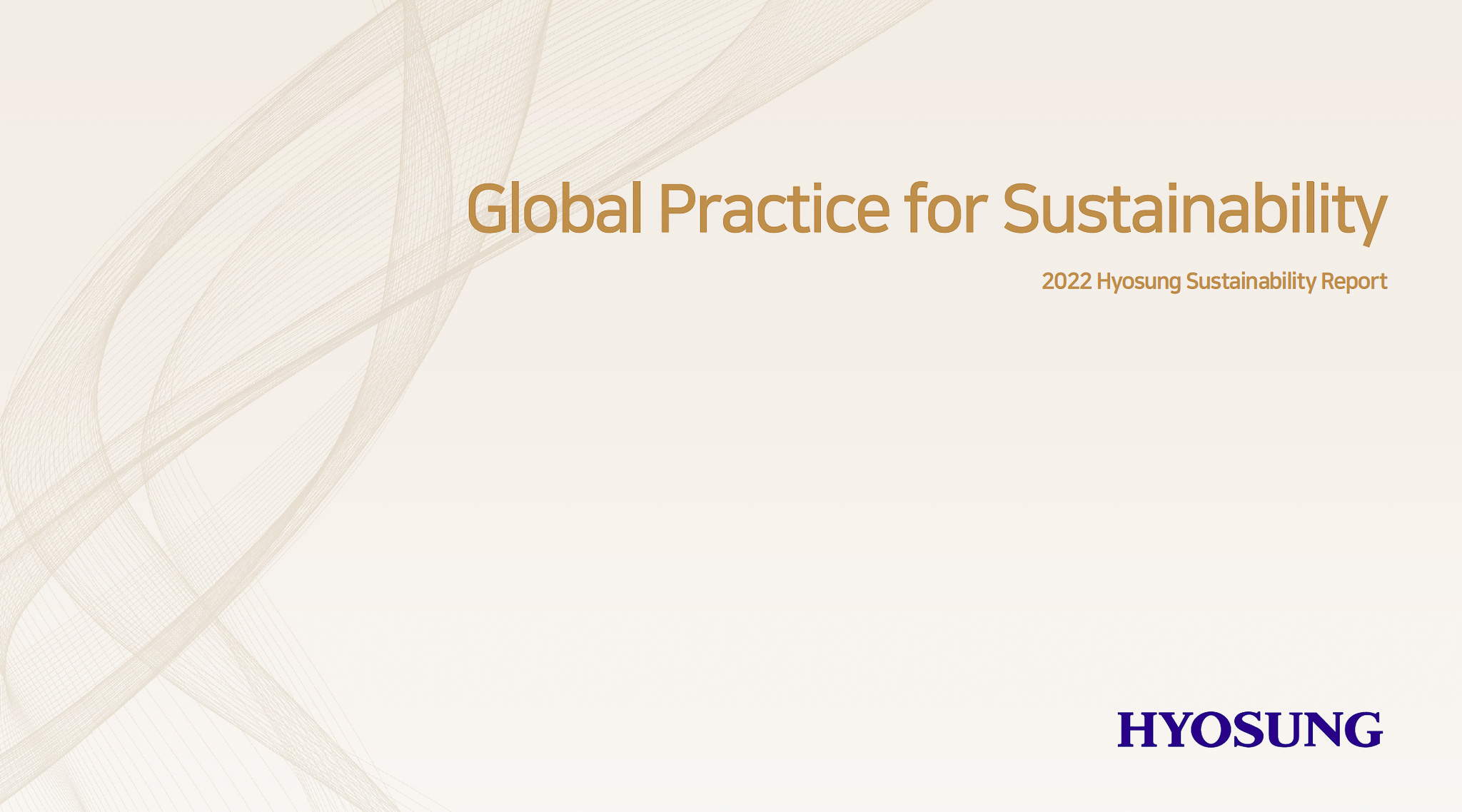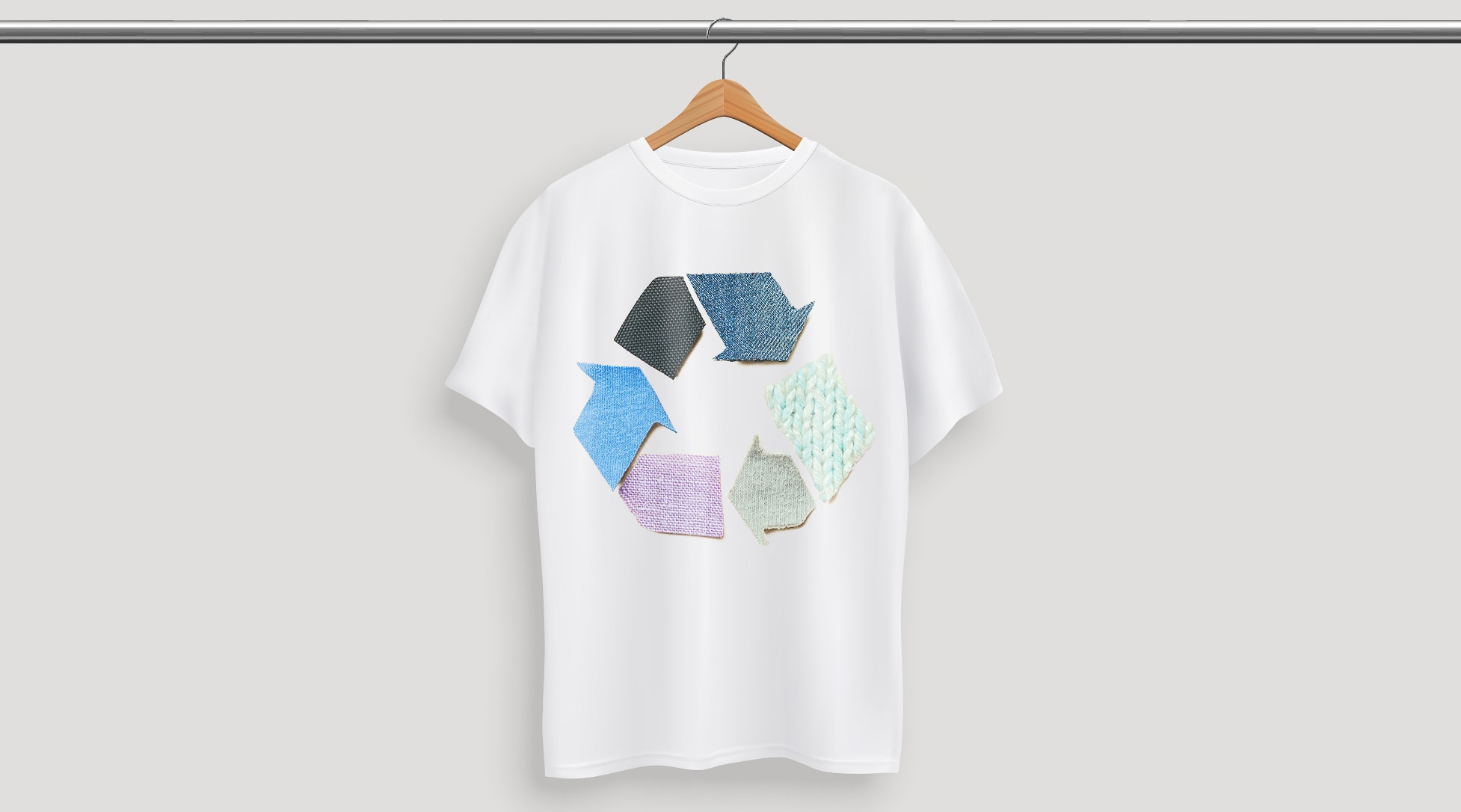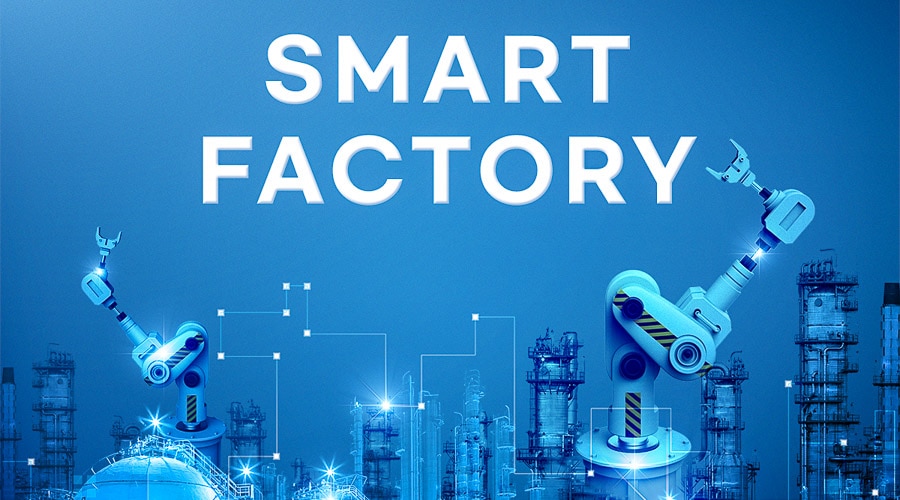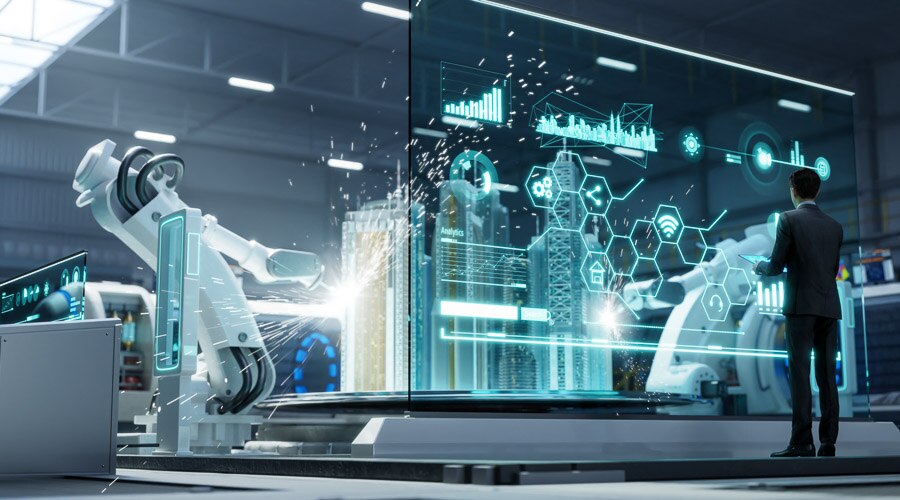Content content
Part 1. Addressing climate change and pursuing sustainable business
HYOSUNG’s sustainability report showcases the company’s commitment to sustainable management strategies, reflecting their determination to improve future lives. The company's efforts in responding to climate change at the corporate level, promoting sustainable businesses, and prioritizing the health and safety of their members serve as evidence of HYOSUNG’s recognition of sustainability as a key driver of long-term growth and innovation.
In particular, HYOSUNG’s participation in the Carbon Disclosure Project (CDP) and adherence to the recommendations of the Task Force on Climate-related Financial Disclosures (TCFD) demonstrate their efforts to establish a climate change response system. Additionally, initiatives such as the development of environmentally focused products under the RE:GEN brand highlight HYOSUNG’s sense of duty and responsibility towards the environment.
The sustainable business manifesto: Green Management Vision 2030
HYOSUNG has established the Green Management Vision 2030 with the objective of leading the way as a sustainable company striving for a better quality of life for humanity. The company has set four main goals, including greenhouse gas reduction, the development and expansion of sustainable technologies and markets, the fostering of a corporate culture through sustainable infrastructure, and the enhancement of trust among stakeholders. In order to achieve these goals, the company has devised detailed action plans for each objective, with the aim of formulating and implementing a comprehensive climate change response strategy at the corporate level.
1.Greenhouse Gas Reduction: HYOSUNG plans to reduce greenhouse gas emissions by at least 14.5% by 2030 compared to 2018 levels. This will be achieved through the expansion of renewable energy adoption, strengthening energy-saving initiatives, and operating internal carbon asset management and product carbon footprint calculation systems.
2.Development of Sustainable Technologies and Market Expansion: HYOSUNG aims to expand its renewable energy business, including hydrogen, solar, and wind power, while enhancing its capabilities in sustainable technologies to pursue carbon neutrality and green growth. The company is expanding the production of circular economy products through initiatives such as recycling PET bottles and dispose fishing nets and plan to offer various sustainable products and services centered around RE:GEN.
3.Fostering a Corporate Culture through Developing Sustainable Infrastructure: HYOSUNG is focusing on enhancing its water and air pollution management systems to minimize environmental pollution and impact by complying with environmental regulations. They aim to reduce the use of natural capital like water through recycling and decrease the amount of waste. They also support their suppliers by providing energy-saving diagnoses and equipment to promote continuous win-win relationships within the supply chain.
4.Building Stakeholder Trust: HYOSUNG is expanding green and sustainable certifications and establishing a green management system to enhance stakeholder trust. They strive for transparency by participating in environmental information disclosure systems and publishing sustainability reports.
Full 2022 HYOSUNG Sustainability Report

Addressing Climate Change through Greenhouse Gas Reduction and Energy Innovation
HYOSUNG’s measures to reduce greenhouse gas emissions are highly specific. The company regularly inspect its facilities to identify and implement measures to reduce emissions, focusing on replacing equipment with high efficiency, improving processes, and introducing low-impact equipment to mitigate the effects of climate change.
The greenhouse gas emissions from HYOSUNG and its four major business sectors started at 1,567,654 tons of carbon dioxide equivalent in 2018, decreased to 1,470,909 tons in 2020, slightly increased to 1,520,242 tons in 2021, but continued to decrease to 1,422,167 tons in 2022. Building on these efforts, HYOSUNG aims to reduce greenhouse gas emissions to 1,336,789 tons by 2030 in line with the Green Management Vision 2030.

▲ The trend and targets for greenhouse gas emissions for five companies within the Hyosung (unit: tCO2eq)
In addition, HYOSUNG is enhancing production efficiency through the establishment of smart factories. Smart factories connect all production-related resources in real-time to the factory floor and analyze collected data to create the optimal production environment. Through this, the company aims to improve production yield and reduce energy consumption, leading to a decrease in greenhouse gas emissions.
Efforts to expand the use of renewable energy are also noteworthy. HYOSUNG is expanding the use of renewable energy through the utilization of biogas generated from wastewater treatment plants, the introduction of solar power generation facilities, and efforts to establish a domestic hydrogen ecosystem through the construction of a liquefied hydrogen plant.
Managing Air Quality, Water Quality, Waste, and Chemical Substances Stricter Than Law
Additionally, HYOSUNG has established an environmental management system based on ISO 14001 and implemented its own environmental management policies for effective oversight.
Based on its environmental management policy, manuals, and processes, HYOSUNG swiftly integrate revisions to environmental regulations and thoroughly review regulations to manage environmental risks. Additionally, the company conducts annual assessments of compliance to continuously improve environmental management. To achieve this, HYOSUNG establishes and reviews environmental management goals and KPIs, including environmental certification, environmental impact assessments, compliance assessments, regulatory management, pollutant emission levels, waste generation and disposal, and stakeholder complaint handling.
In terms of managing air pollutants, HYOSUNG not only complies with legal emission standards but also sets stricter internal emission standards, continually monitors them, and makes necessary equipment replacements to maintain compliance. The company applies standards that are 20% to 50% lower than legal emission limits and plans to expand the installation of real-time air pollutant emission monitoring systems (TMS) at its facilities to establish a real-time monitoring system. HYOSUNG is also installing low-NOx burners to reduce NOx emissions and engaging in voluntary agreements to reduce fine dust and pollutants.
For water pollutants, the company established and is managing its own standards, which are 30% to 50% below legal emission limits. HYOSUNG is also conducting water quality analysis for specific hazardous substances four times a year at all facilities to check for the discharge of new pollutants. Additionally, the company commissions monthly water quality analyses to external experts, enhances treatment efficiency through sludge removal, and operates a monitoring system that sends immediate alert to abnormal levels of pollutants in inflow wastewater, maximizing the efficiency of water quality pollutant management.
Sustainable Products and Services
HYOSUNG is expanding its portfolio of sustainable businesses with the goal of promoting a circular economy and global carbon reduction. To secure sustainable growth and future growth momentum, the company is introducing various sustainable products and services through its subsidiaries, with the RE:GEN eco-strategy brand at the center.
Hyosung TNC Implements a Resource Recycling Model with regen
Regen, a recycled fiber specialist brand introduced by Hyosung TNC, utilizes recycled resources such as discarded fishing nets and PET bottles to produce fiber materials. regen Ocean Nylon, made from recycled nylon fiber using discarded fishing nets, which account for about 46% of marine waste, is produced by collecting discarded fishing nets in collaboration with local governments, removing impurities, and converting them into recycled nylon, thus realizing a resource recycling model. Recycled nylon from regen which utilizes discarded raw materials in the fiber manufacturing process, is a sustainable material that reduces petroleum consumption and carbon emissions. regen Nylon, sought after by global brands, is an excellent solution to the plastic problem faced by the fiber industry.
Developed in response to the plastic waste problem, regen Polyester is a fiber that extracts useful components from discarded PET bottles for reuse. As a result of the characteristics of recycled products, it has achieved a reduction of about 60% in CO2 emissions compared to traditional polyester fibers, thereby reducing the amount of waste and contributing to environmental conservation.
Hyosung Heavy Industries Leads Sustainable Energy Solutions
Hyosung Heavy Industries' sustainable business encompasses a wide range, from power systems to industrial machinery and sustainable construction projects. Particularly noteworthy are the product lines in the power systems sector, such as energy storage systems (ESS), STATCOM, solar PV converters (PCS), low environmental impact transformers, and GIS. These products contribute to building sustainable power infrastructure by providing sustainable energy solutions.

▲ Hyosung Heavy Industries' STATCOM
In the industrial machinery sector, high-efficiency premium motors and hydrogen fueling stations stand out as major sustainable items. High-efficiency premium motors contribute to sustainability across industries by minimizing energy consumption while maximizing performance. Additionally, hydrogen fueling stations play a crucial role in accelerating the adoption and utilization of sustainable hydrogen energy, thereby building the infrastructure for future sustainable transportation.
In the construction sector, efforts are being made to achieve green construction through obtaining green building certifications.
Hyosung Advanced Materials Leads the Future of Sustainable Industries
Hyosung Advanced Materials has significantly reduced the use of harmful chemicals in the Chemical Dip solution used in the final stage of tire cord manufacturing. This new Dip solution, expected to be commercially available soon, extends the lifespan of tires even without formalin, contributing to reducing waste tires.
TANSOME®, a pride of Hyosung Advanced Materials, is essential for making spacecraft, airplanes, and cars lightweight. TANSOME® is more than four times lighter than steel and has over ten times the strength, significantly contributing to fuel efficiency improvement and carbon emission reduction. Furthermore, TANSOME® is applied in various sustainable energy industries, including high-pressure fuel tanks required for hydrogen energy use.

▲ Carbon Fiber Tansome
The low-carbon-based "Lyocell tire cord" is a sustainable solution that can replace traditional rayon or nylon tire cords. This new tire cord reduces greenhouse gas emissions by approximately 30% and minimizes the generation of harmful substances (CS2, H2S, etc.) during the manufacturing process, thus preventing air and water pollution.
Hyosung Advanced Materials' innovation does not stop here. The company has developed industrial-grade bio-polyester yarn made from plant-based raw materials, extracted bioethylene glycol, and applied it to Hyundai Motor's sustainable vehicles, such as IONIQ and NEXO.
Hyosung Chemicals Leads Sustainable Future with Sustainable Materials
Hyosung Chemicals' sustainable engineering plastic, POKETONTM, developed as the world's first, dramatically reduces carbon emissions. With only 3.08kg-CO2eq per kg, this new material has its sustainability verified through Life Cycle Assessment (LCA). POKETONTM has also been certified for its safety and harmlessness by numerous domestic and international certification bodies, including the Food and Drug Administration (FDA), proving its potential as a next-generation engineering plastic material.

▲ Hyosung Chemicals' sustainable engineering plastic, POKETONTM
Bio-based "TAC film" meets the minimum biomass content requirement of 45% and has been certified by the United States Department of Agriculture (USDA) BioPreferred® program. This is another example showing Hyosung Chemicals' leadership in developing sustainable materials.
Membrane water treatment system technology functions as a filter membrane with extremely small pore sizes (0.03μm), allowing only desired substances to pass through. With environmental technology certification already in hand, it has been applied to several water treatment plant projects, contributing to the supply of clean water.
HYOSUNG’s 2022 Sustainability Report demonstrates the company’s deep commitment and sincerity toward a sustainable future by expanding sustainable businesses to combat climate change. HYOSUNG has made significant progress in areas such as greenhouse gas reduction, sustainable technology development, promoting circular economy, and building trust with stakeholders through Green Management Vision 2030. With initiatives like smart factory construction, expanding the use of renewable energy, and developing carbon capture technology, HYOSUNG is proving its effectiveness in achieving tangible results.










